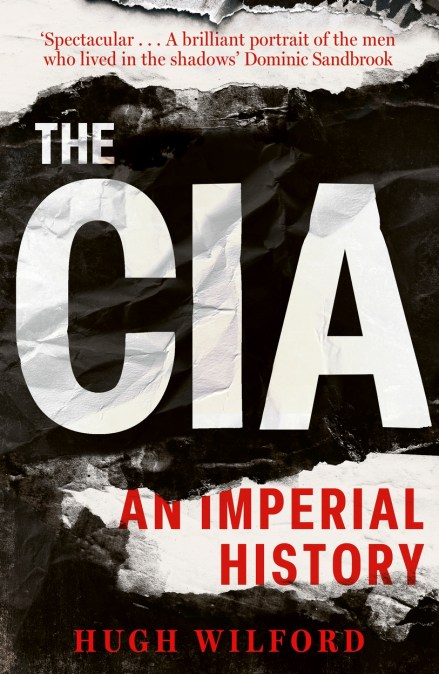A TIMES BOOK OF THE YEAR 2024
A NEW YORKER BEST BOOK OF 2024
‘Gripping history that also informs the present’ Sunday Times
‘Lively and original’ The Spectator
‘A spectacular achievement’ Dominic Sandbrook
‘Fast-paced, absorbing, insightful’ Simon Hall
‘Simply superb’ Kathryn Olmsted
The definitive history of how the CIA became the foremost defender of America’s covert global empire
As World War II ended, the United States stood as the dominant power on the world stage. In 1947, to support its new global status, it created the CIA to analyse foreign intelligence. But within a few years, the Agency was engaged in other operations: bolstering pro-American governments, overthrowing nationalist leaders, and surveilling anti-imperial dissenters at home.
The Cold War was an obvious reason for this transformation – but not the only one. In The CIA, celebrated British intelligence historian Hugh Wilford draws on decades of research to show the Agency as part of a larger picture: the history of Western empire. While young CIA officers imagined themselves as British imperial agents like T. E. Lawrence, successive US presidents used the covert powers of the Agency to hide overseas interventions from postcolonial foreigners and anti-imperial Americans alike. Even the CIA’s post-9/11 global hunt for terrorists was haunted by the ghosts of empires past.
Comprehensive, original, and gripping, The CIA is the story of the birth of a new imperial order in the shadows. It offers the most complete account yet of how America adopted unaccountable power and secrecy abroad and at home.
A NEW YORKER BEST BOOK OF 2024
‘Gripping history that also informs the present’ Sunday Times
‘Lively and original’ The Spectator
‘A spectacular achievement’ Dominic Sandbrook
‘Fast-paced, absorbing, insightful’ Simon Hall
‘Simply superb’ Kathryn Olmsted
The definitive history of how the CIA became the foremost defender of America’s covert global empire
As World War II ended, the United States stood as the dominant power on the world stage. In 1947, to support its new global status, it created the CIA to analyse foreign intelligence. But within a few years, the Agency was engaged in other operations: bolstering pro-American governments, overthrowing nationalist leaders, and surveilling anti-imperial dissenters at home.
The Cold War was an obvious reason for this transformation – but not the only one. In The CIA, celebrated British intelligence historian Hugh Wilford draws on decades of research to show the Agency as part of a larger picture: the history of Western empire. While young CIA officers imagined themselves as British imperial agents like T. E. Lawrence, successive US presidents used the covert powers of the Agency to hide overseas interventions from postcolonial foreigners and anti-imperial Americans alike. Even the CIA’s post-9/11 global hunt for terrorists was haunted by the ghosts of empires past.
Comprehensive, original, and gripping, The CIA is the story of the birth of a new imperial order in the shadows. It offers the most complete account yet of how America adopted unaccountable power and secrecy abroad and at home.
Newsletter Signup
By clicking ‘Sign Up,’ I acknowledge that I have read and agree to Hachette Book Group’s Privacy Policy and Terms of Use
Reviews
A spectacular achievement: learned, thoughtful, frequently surprising, often wryly funny, always gloriously readable. It's a serious work of scholarship . . . a brilliant portrait of the men who lived in the shadows . . . It's the best book yet from a supremely accomplished historian - and I loved it
In this fast-paced, absorbing, and insightful narrative, Wilford offers a bracing new interpretation of the Central Intelligence Agency . . . A story packed with intrigue, rivalry, and scandal, this is history at its bold and provocative best
One of those rare and irresistible publications which transform how you think about its subject matter . . . The cast of characters is a rogue's gallery of swashbuckling spies and saboteurs . . . In charting how this band of imperial adventurers looked to covertly redraw the map of the world, especially in the global south, this magnificent book will change our understanding of the history of the CIA and American foreign relations
Wilford is an undisputed authority on the history of the CIA . . . His new book is another blockbuster . . . The past lives but it needs to be brought to life - and Wilford has shown once again that he is a master of that particular art. A must read
An ambitious and original book. It is not only richly informative but also provocative and insightful. Filled with fascinating and brilliantly researched detail, it shows how the rise of the CIA is intertwined with America's winding path to globalism
A pleasure to read, an excellent example of erudition lightly worn. Wilford shows that when CIA leaders found their anti-imperial ideas did not fit their requirements, they found a new vocabulary in the very language of imperialism that their nation had so often rejected
This elegantly written history places the CIA within the context of American empire, and, in the process, reshapes our understanding of U.S. intelligence history. With lively prose and memorable characters, Wilford has crafted a narrative that will appeal to scholars and to general readers alike. It's simply superb
Wilford has again exposed another layer of the CIA's shrouded history by tying it to the history of the US empire. This innovative and rigorously researched merger internationalizes the agency's history even as it enhances understanding of its behavior and image. Wilford excavates the foreign and the domestic; people and places. The result is a different kind of survey that reveals a different kind of CIA
The CIA is often portrayed as a quintessentially American institution, but Wilford shows that it is also a product of European imperial history. By delving into the life stories of key officers, he sheds new light on a complex and sometimes terrifying story. Placing the CIA in its global context allows us to understand this shadow world in a completely new way
Fascinating . . . a lively and original thesis . . . Wilford writes engagingly, with a telling eye for colourful detail . . . an absorbing read that adds much to our understanding of the CIA
A sober, comprehensive work of history . . . Wilford writes with clarity and nuance . . . Drawing on declassified CIA archives, Wilford lets the secret agents reveal their secrets. He quotes them at length, giving an intimate feel to an otherwise panoramic history . . . makes for gripping history that also informs the present
A new and provocative twist on the history of CIA covert action
A nicely provocative argument, and one that Hugh Wilford develops with impressive enthusiasm

